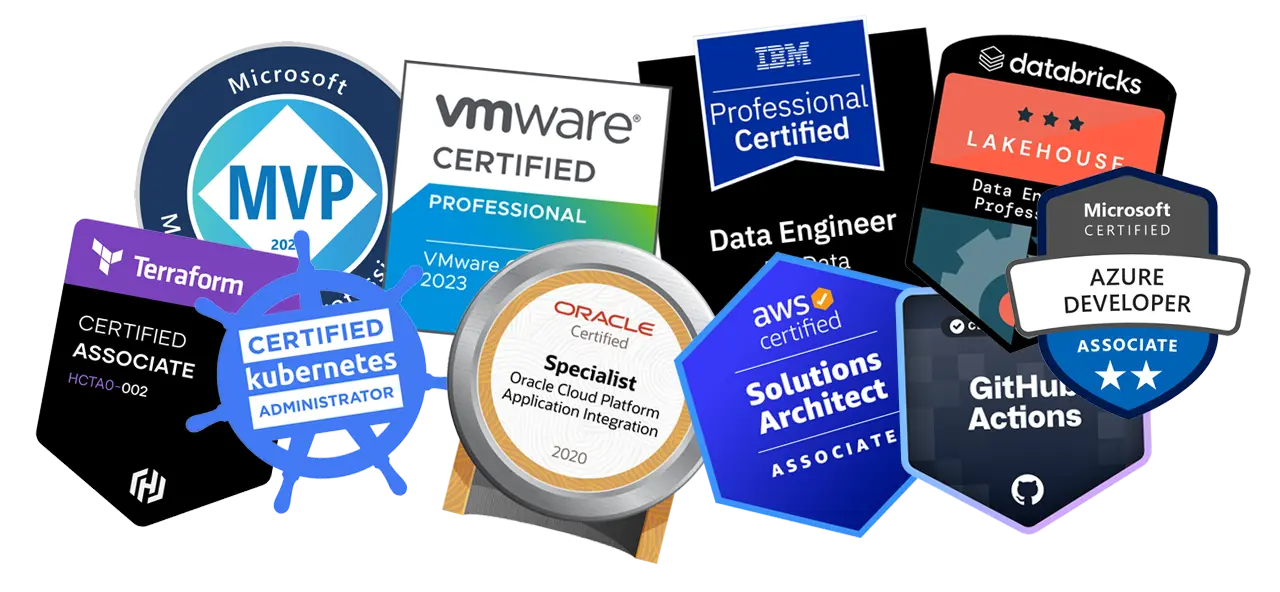Boost your pro career with certifications 🏅
After 12 cloud and DevOps certifications, I can tell you that I’ve learned a lot. Those little virtual badges have managed to stimulate my dopamine, and the reward isn’t just a chemical reaction in my brain. Some people ask me about certifications, and I want to summarize what I say to them into a single article, so that you too can benefit from this system which, in my opinion, values the skills of everyone, but still needs to be nuanced in the professional world.
Gaining skills through certification
As of writing these lines, I’m a consultant within the consulting company Devoteam M Cloud, which specializes in Microsoft technologies. I did my studies as a cloud engineer then I discovered DevOps practices with my client Carrefour. But doing labs on Terraform and be a good student at school weren’t enough to get me an internship, then a job.
If your diploma, experience or studies aren’t related to your desired career, certifications might be the solution
To be confident while seeking for a job, get certified, even if you don’t have the practical skills. It won’t replace 5 years of hard studies, however certification will get you into the learning to learn process, and that’s essential for progress. 3 certifications a year are enough to adopt a healthy learning pace and not lose interest in learning.
Even if you’re already in a good situation, you could grow in your carreer
Certifications are obviously a proof of your hard skills. It goes without saying that certified Kubernetes administrators (CKAs) know what they are talking about when it comes to this highly specialized technology. But even being the best does no guarantee knowing the technology from every angle. Getting a certification, even after 10 years experience, keeps you up to date and assures that you will progress regardless.
Also, you’ll be in competition with 87% of all IT specialists that own at lease one certification, so make sure to grab the best badges you can. Even if you have “nothing left to prove”, it’s still a card to play at interviews.
Certificators : are they on your side for your career?
Solution providers want to approve your skills. It’s also a way of promoting their services, but above all, it’s a rigorous guarantee of excellence (because you’re very serious and professional). But beware of the easy way.
Each certification is very profitable for the organizations: ~€4 per Credly badge added to the price of the Pearson/PSI exam will hardly cost more than the hundred or so euros (on average) needed to pass your exam. That’s why low-level exams are useful for stepping into the solution and finding a (first) well-paid job, but don’t rely on these to show your true worth, especially as the bill can quickly add up.
Recruiters know the value of certifications
I took the liberty of asking 3 recruiters at my company for their opinions on the subject. Starting with the place of a certification in a resume. I was told that certifications weren’t as important as diplomas and experience, but that they still had their place in this document. Here’s an answer that sums it all up: “they [certifications] can’t do everything for the candidate, but they do provide a solid foundation of technical and theoretical knowledge of IT subjects”.
I also asked this question: “Would a profile without a degree but with excellent certifications continue in the recruitment process?”. The overall answer was more of a yes, but with some specifics: “Not having a degree isn’t the only condition, even if it’s true that we mainly recruit graduate engineers. Once again, technical skills and posture are more important than anything else!”
So, yes, all certifications give you a better chance at being hired, but think twice if that’s all you’ve got in your hand!
What about companies and salespeople?
Being in a consulting company, I asked two sales people for their opinion on the subject. As close as possible to the customer’s needs, they can distinguish bullshit from real competence. They confirm that certifications undeniably add value to a profile. “Certifications proves a willingness to learn, and that’s something the customer is sensitive to”.
But the challenge also matters: “Everybody has a basic certification, I’m preparing for the AZ-900 myself, but if you go up in difficulty, it becomes more complicated to get one, and that’s what we’re looking for. A junior with an AWS Solutions Architect, for example, will have real added value, because it’s hard to get”. It’s also complicated for some customers to select someone for their certifications, which shows that practice in a professional environment always has an advantage over theory.
How certifications can multiply and validate your skills
Grow within your company
Day zero, I decided to pass the AZ-900 certification, which focuses on the basics of the Azure cloud. It opened the door to an internship at the company I still work for today. It’s a basic certification on which I train recruiters, sales people and project managers (the same people as above!). It’s also a good way, in a company where exams are often financed, to learn more stuff even if it’s not your core work career. The people who have been certified thanks to my training assure me that they now have the basics to better understand the field in which they are evolving. A certified recruiter will be able to distinguish between VMs and containers on a resume, even if setting up a Kubernetes infrastructure is not their job.
Technology and people evolve rapidly
Most certifications are renewable, and for a good reason: keep you up to date. Every 2 years or so, you should receive an email to reassess an exam, sometimes a very light version of it. It’s really handy, because even if some of them can easily be passed again (Microsoft, for example, doesn’t monitor the reassessment exam), it helps you stay on track with today’s tools (and a big thanks to our dear three-lettered friend).
Which certification to choose
Here’s what I recommend as certifications for different fields. Don’t hesitate to do your own research or to suggest edits :
- Cloud architect : AWS Solutions Architect, AZ-104 even AZ-305 & Google Cloud Professional cloud Architect
- Data engineer : DP-203 or IBM Data Engineering Professional
- Cybersecurity expert : CISSP, CISM even CompTIA Security+
- DevOps architect : Hashicorp Terraform, Kubernetes CKA & AZ-400 are must-have
- ERP/CRM engineer : SAP Certified Application Associate, PL-600 or Oracle E-Business Suite depending on which technology you choose
- Gestion de projet : PRINCE2 of course, but don’t forget CSM or PMP

What you could showcase on your resume
Good practices to maximize your chances on passing a certification
Certifications must’nt overshadow practice
It’s true that there are some cheating websites out there for learning by heart the answers. Learning theory can also cover every possible use case of a domain. But in the business industry, there’s nothing more important than practice. Proof-of-concepts, exercises, labs and exercizing are essential to assimilate the content of the certification. I don’t recommend taking one without practice, without trying out the main topics of an exam. Even better in your professional environment. If you don’t practise, you run the risk of devaluing a skill that you’ve only learned in theory, or even just crammed and forgotten after the exam.
Cramming’s fine, retain the information is better
To make sure you don’t forget the essentials of the theory, you need to keep up the good practices of your years of study. Write notes up and make revision sheets. I personally use Notion, but Word, markdown or good old paper will be your life friends. Not only are notes useful for revising one last time, but they also help to put down in writing what’s on your mind so that you don’t miss an essential point.
Learning is also sharing
A good way of motivating yourself to pass an exam is to prepare for it with someone else. Motivation is fairly easy to share in today’s highly gamified training, such as the badges that mark the end of a hard-worked training session. Discussions force you to always double check information and avoid saying fake news. Learning with someone else also allows you to rephrase a subject to someone who has misunderstood it. And reformulating a subject means mastering it.
Punctuate your learning with deadlines
To never give up, it’s essential to set yourself some deadlines :
- A number of certifications per year (personally I go for 3)
- A launch date for the training, preferably now.
- A frequency of training, for example 2 hours per week (or per day for the best among us)
- Some time before you finish the course, or if it’s not going well, set an exam date so that you can do a final sprint before the big day.
Learning while having fun: gamification in training
Reward yourself with gamification
Like sport, training is a great way to get your dopamine shoot in a positive way. I have a great time with Microsoft Learn when I see my XP points go up, and when I watch my Credly badges accumulate. Certifications will touch those of us who are most sensitive to reward.
Haven’t we learned that happiness comes from a perpetual feeling of joy? I personally use Udemy, but A Cloud Guru, KodeKloud and other learning platforms are all gamified. Regularly completing chapters of a training course easily gives you a sense of achievement, and in a very accessible way. The proof is there: I’m very happy myself, thanks to the certifications!
The pleasure of being a driving force
By always being up to date, you can also test the latest technical or managerial advances in your everyday life. Bringing knowledge to your work allows you to make suggestions and perhaps become indispensable, while that’s something that only happens in the long term. That’s why I think it’s essential to keep training, whatever your experience is, and that certifications are always a good way for timing your skills evolution.
Conclusion
It’s true that certifications are very rewarding both professionally and personally. They allow you to
- demonstrate your skills
- progress in your field
- exchange ideas with your peers
- get a dopamine shoot
On the other hand, I wouldn’t recommend taking them without practising. After 20 years of study, it’s clear that listening to (or worse, reading) a course is not enough to fully assimilate a subject. Taking notes, talking to your peers and having an interest in the subject that goes beyond the course itself are all essential parts of any self-study program. It’s by applying all these rules that I’m going back to my Kubernetes training course to pass the CKA ⚓️
Thanks to Benjamin Attali, Antoine Bouchareissas, Danaé Bétolaud, Elisa Abitbol and Cécile Augusti for their contributions
🤖 This article was written without the help of an AI
Banner “Diploma” generated by DALL•E
